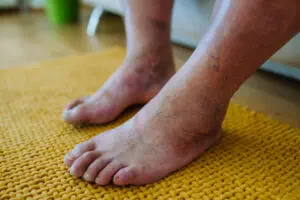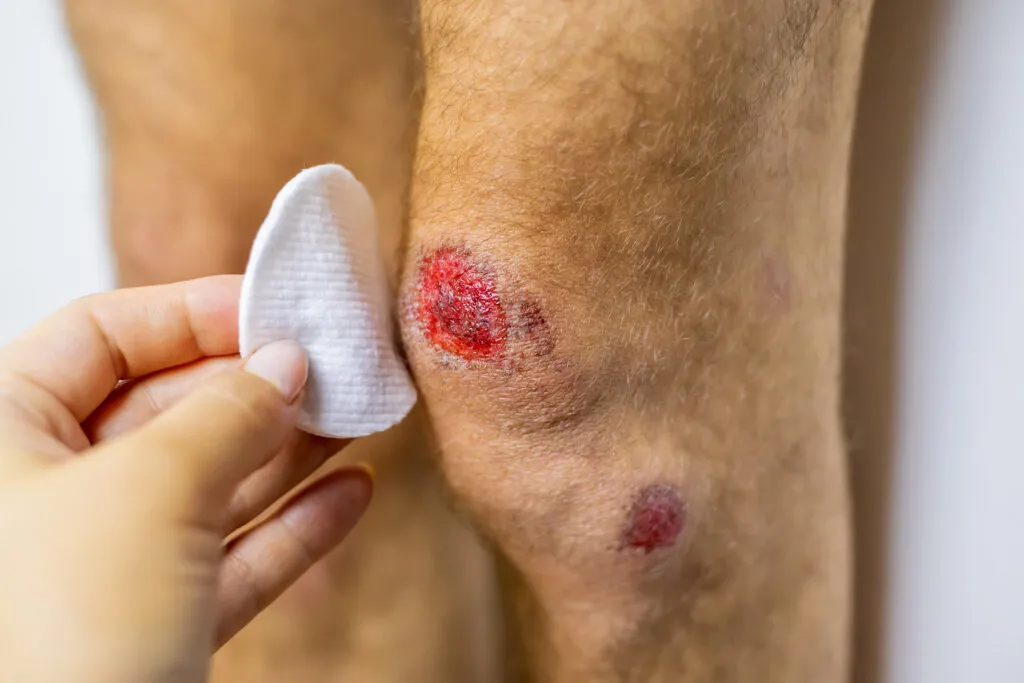The Dangers of Untreated Wounds
The Hidden Danger Behind Everyday Injuries
A scrape. A blister. A paper cut. A small surgical wound.
You might brush it off. Cover it with a Band-Aid. Move on with your day.
But what happens when that wound doesn’t heal?
Weeks go by. It stays red. Swollen. Painful. Maybe even starts oozing.
That’s not normal. That’s not healing. That’s a warning sign.
Untreated wounds don’t just linger—they can spiral.
Infection. Tissue damage. Scarring. Or worse: amputation.
According to Johns Hopkins Medicine, wounds that remain open beyond 30 days are classified as chronic and require specialized care to prevent long-term damage.
And if you have diabetes? Or vascular disease? The risks double.
CDC.gov reports that up to 25% of diabetics will develop foot ulcers—and 1 in 5 of those may result in an amputation without proper intervention.
Let’s break down why untreated wounds are dangerous—and what you can do about it.
Chronic Wound Complications You Can’t Afford to Ignore
Chronic wounds are more than just slow to heal. They open the door to life-threatening complications, especially when not treated by a wound care specialist.
What Happens When a Wound Becomes Chronic?
- Infection: Once a wound is exposed for too long, bacteria can enter easily, leading to cellulitis, abscesses, or even systemic infections like sepsis.
- Tissue death: Poor oxygen flow causes tissue to break down, turning into ulcers or gangrene.
- Delayed healing: A chronic wound stalls in the inflammatory phase. Healing that should take days can stretch into months.
- Permanent damage: Especially in joints or tendons, this could limit your mobility long-term.
- Amputation: Chronic wound complications are among the leading causes of limb amputation in diabetic patients.
🔗 Learn how we treat chronic wounds safely and effectively.
Spotting Trouble Early: Signs Your Wound Needs Help
Not all wounds become dangerous—but some give you clear warnings. Here’s what to look for.
How Can You Tell If a Wound Is Infected or Chronic?
If your wound hasn’t closed after four weeks, it’s officially chronic. But don’t wait until then. Seek help if you notice:
- Increased pain, redness, or swelling
- Warmth around the wound
- Yellow or green discharge, or a bad odor
- Fever or chills (a sign the infection is spreading)
- Dark or black edges (indicating tissue death)
These symptoms require immediate attention. At our Wound Care Louisville center, we use advanced imaging and culture testing to assess the severity of wounds and begin targeted treatment right away.
💡 Don’t wait for it to get worse—schedule a professional wound assessment now.
Who Is Most at Risk of Chronic Wound Complications?
While anyone can develop complications, some groups are especially vulnerable.
High-Risk Groups Include:
- Diabetics: Poor circulation and nerve damage can make it easy to miss signs of infection.
- Older Adults: Natural aging slows regeneration and weakens immune responses.
- Immunocompromised Patients: Cancer therapies, organ transplants, and autoimmune diseases lower infection resistance.
- People with Vascular Disease: Poor blood flow delays oxygen delivery to healing tissues.
Even a small wound can become dangerous if you fall into any of these groups.
🔗 Explore vascular wound care services at our Louisville clinic.
Amputation Risk: Why Timing Is Everything

This isn’t fear-mongering. It’s the truth.
Can Untreated Wounds Really Lead to Amputation?
Yes—especially among patients with diabetes or peripheral artery disease. Here’s why:
- Up to 25% of diabetics will develop foot ulcers.
- 20% of those will require an amputation if not treated.
- Early intervention can reduce this risk by over 85%.
At OWC Center, our Limb Preservation Program includes:
- Oxygen Therapy
- Wound Vac Therapy
- Surgical Debridement
- Custom Offloading Footwear
- Skin Grafting Procedures
When to Seek Help: Don’t Wait for It to Get Worse
You Should See a Wound Specialist If:
- The wound hasn’t healed in 2–4 weeks
- There are signs of infection
- You have diabetes, vascular disease, or autoimmune conditions
- The wound is deep, large, or over joints
- You’ve already tried first aid and it hasn’t worked
Wound specialists use more than bandages. You may need:
- Wound vac therapy
- Hyperbaric oxygen treatment
- Skin substitutes or grafts
- Vascular imaging and offloading strategies
Book your evaluation at our Louisville clinic today.
Every wound tells a story—and how you respond to it can change the ending. What starts as a minor scrape or blister can silently shift into something much more dangerous, especially for those with diabetes, vascular issues, or weakened immune systems. In these cases, untreated wounds can quickly spiral: infections deepen, tissue begins to die, and mobility—and even limbs—are put at risk.
The key isn’t just care—it’s timing. When a wound lingers past the four-week mark or shows signs like swelling, discharge, or darkened edges, it’s time to stop waiting and start acting. Chronic wounds aren’t just slow to heal; they represent a deeper issue in the body’s ability to recover. And unfortunately, the stakes are high: limb preservation, quality of life, and even survival can hinge on whether someone receives proper treatment in time.
Thankfully, specialized wound care—like what’s offered at our Louisville clinic—can make all the difference. Through tools like oxygen therapy, wound vacs, and vascular imaging, healing can begin where standard bandages fall short. Because behind every successful recovery is a patient who didn’t wait—and a team who knew exactly how to help.
Key Takeaways
1. Untreated wounds can lead to life-altering complications—even amputation.
When a wound doesn’t heal within 30 days, it becomes chronic. This increases the risk of infections, tissue death, and, in severe cases, amputation. Specialized wound care at our Louisville clinic helps prevent these outcomes with timely, expert treatment.
- Watch for signs of infection and don’t wait to seek help.
Redness, swelling, pus, warmth, and blackened skin edges are red flags. These may signal that your wound is infected or deteriorating. If you’re noticing any of these, schedule a professional wound assessment to begin the healing process immediately.
- People with diabetes and vascular disease are at higher risk.
If you have diabetes, peripheral artery disease, or a suppressed immune system, even minor wounds can spiral quickly. Our vascular wound care team provides advanced, targeted treatments to reduce your risk.
- Advanced therapies can make a major difference.
Standard first aid isn’t enough for chronic or complex wounds. Our clinic offers cutting-edge options like oxygen therapy, wound vacs, and skin grafting—designed to accelerate healing and preserve quality of life.
- Early intervention is key to preserving limbs and lives.
Don’t wait weeks hoping a wound will improve. By seeing a wound specialist early, you can drastically reduce your risk of long-term damage. Explore our limb preservation program and take the first step toward recovery today.
5 Common Questions About Untreated Wounds — Answered
1. Why is it dangerous to leave a wound untreated?
Leaving a wound untreated can lead to serious complications, especially in people with diabetes, poor circulation, or weakened immune systems.
Here’s what can happen:
- Infection: Bacteria can easily enter the wound, causing cellulitis, abscesses, or even sepsis.
- Tissue damage: Oxygen-starved tissues can begin to break down, leading to ulcers or gangrene.
- Delayed healing: Without proper care, the wound’s healing process stalls. What should take days could take months—or never fully heal.
- Permanent scarring or mobility issues: Especially if joints or tendons are affected.
- Amputation risk: Chronic wound complications are a leading cause of limb amputation, particularly in diabetic patients.
2. How can you tell if a wound has become chronic or infected?
If a wound hasn’t healed in four weeks, it’s considered chronic. But even before that, watch for signs like:
- Increased pain, redness, or swelling
- Warmth around the wound
- Discharge or a foul odor
- Fever or chills (sign of systemic infection)
- Dark or black edges (possible necrosis)
These are all reasons to visit a wound care specialist immediately. At our Louisville clinic, we use advanced diagnostic tools to assess wound progression and infection levels, helping you avoid hospitalization or surgery.
3. Who is most at risk for wound complications?
While anyone can suffer complications from an untreated wound, some groups are especially vulnerable:
- Diabetics: Reduced sensation and poor circulation increase the risk of unnoticed injuries and infections.
- Older adults: Slower regeneration and weaker immune systems slow healing.
- Cancer or transplant patients: Immunosuppressive treatments reduce infection-fighting ability.
- People with vascular conditions: Poor blood flow delays healing and increases infection risk.
If you’re in any of these categories, even minor wounds should be monitored closely.
🔗 Explore vascular wound care services available at our center.
4. Can untreated wounds really lead to amputation?
Yes—especially in cases where wounds become infected or turn into non-healing ulcers.
A few key stats:
- Up to 25% of diabetics will experience a foot ulcer in their lifetime.
- Of those, 1 in 5 may end up needing an amputation if care is delayed.
- Early wound care reduces amputation risk by over 85%.
At OWC Center, our limb preservation program is designed to catch these risks early and use advanced treatments like oxygen therapy, debridement, and custom offloading to prevent long-term damage.
5. When should I see a wound care specialist?
If your wound meets any of the following, don’t wait:
- It hasn’t healed within 2–4 weeks.
- It shows signs of infection.
- You have underlying health conditions like diabetes, PAD, or autoimmune disease.
- It’s deep, large, or located over joints.
- You’ve already tried basic first aid without success.
A wound care specialist can provide targeted treatment that goes far beyond bandages—like wound vacs, hyperbaric oxygen, and skin grafts.
📞 Don’t leave it to chance—book your evaluation at our Louisville clinic today.




